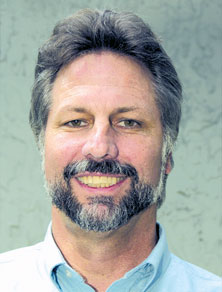In the case that won’t go away, the city is taking Bruce
Tichinin to the California Supreme Court.
In the case that won’t go away, the city is taking Bruce Tichinin to the California Supreme Court.
The City of Morgan Hill filed a petition Friday to the California Supreme Court requesting a review of the 6th District Court of Appeals decision in Tichinin v. City of Morgan Hill, which sided with Tichinin in September, according to city attorney Danny Wan.
“We feel there are policy issues for the supreme court to decide:
Whether or not cities and counties should be threatened with litigation for speaking out or expressing their opinions,” Wan said. “And that’s all the council did. And they did so in public after an investigation.”
In January 2006, local attorney Bruce Tichinin filed a lawsuit against the city of Morgan Hill for damages he says were caused by a slap-on-the-wrist resolution they passed after he hired a spy to follow City Manager Ed Tewes. In December 2006, the trial court dismissed the lawsuit. Tichinin appealed, and on Sept. 29 the appeals court agreed that Tichinin should have the chance to convince a jury.
Both parties claim that if their side wins, it would be a win for the First Amendment. While Tichinin says it’s within his rights as a citizen to look into suspected misconduct, city officials argue they have free speech rights, too, and can refute such allegations. But Tichinin says their refuting caused him significant distress professionally and personally. The 6th District Appellate Court agreed that he should get the chance to persuade a jury that the city owes him for this distress.
The case arose out of a Morgan Hill City Council resolution condemning Tichinin for having hired a private investigator to spy on and videotape Tewes. Tichinin alleged that Tewes opposed his client’s development project application before the city council because Tichinin had spoken out against The Ford Store of Morgan Hill, which the city had backed.
Through spying, Tichinin hoped to collect evidence of a rumored affair between Tewes and then-city attorney Helene Leichter in order to disqualify Leichter from advising the council on the development project. Tichinin sued the city alleging that the city violated his first amendment rights by passing the city council resolution.
Tichinin didn’t find any evidence of an affair after a bungled spying attempt at a Huntington Beach hotel in February 2004 that involved two cups of hot chocolate being ordered to Tewes room by unlicensed private investigator Brian Carey. Tewes caught Carey recording his actions as he exited his hotel room. Both Tewes and Leichter denied the affair.
Wan noted that the city’s resolution directed no steps against Mr. Tichinin, but merely expressed disapproval of Tichinin’s unwarranted and covert surveillance of the city manager.
“The city did not forbid Mr. Tichinin from engaging in litigation activity or ban him from appearing at public meetings. The city took no action other than issuing a resolution expressing its outrage,” Wan said in the statement. “The Court of Appeal decision threatens cities and counties across the state with liability simply because their legislative bodies speak out about issues important to their communities and employees.”
The Tichinin lawsuit has cost the city $100,000, Wan said. That’s the city’s deductible on their insurance policy with the Association of Bay Area Governments.
Tewes said at the time that he was shaken and distressed by what he considered to be intrusive surveillance, and he feared for his family, according to city documents.
Leichter, now Santa Clara’s city attorney, was awarded $215,000 in salary, benefits and compensation for “alleged physical injury or sickness” in a settlement agreement when she resigned in April 2005.
The California Supreme Court has 100 days to respond to the city’s request, Wan said.








